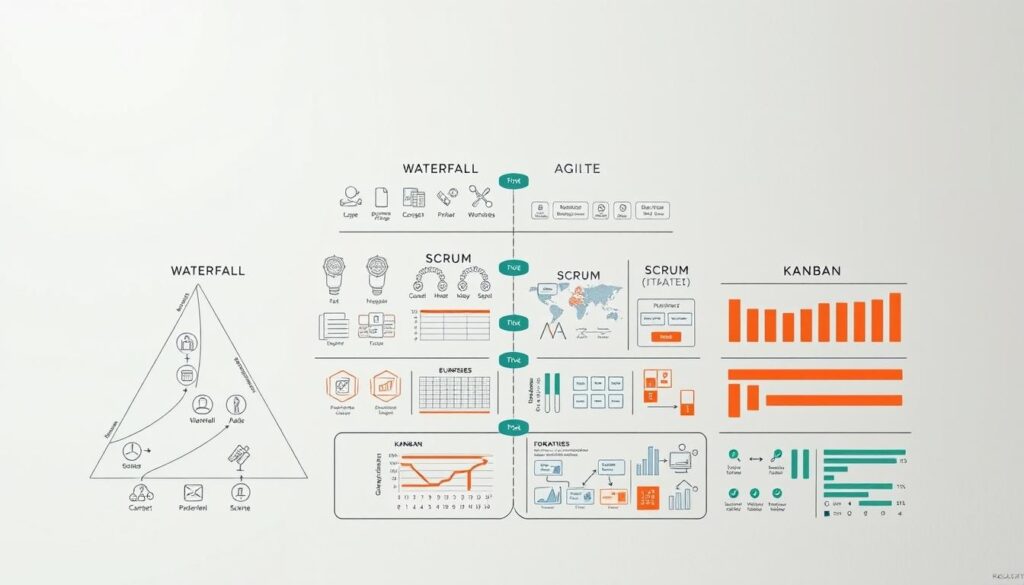In today’s fast-paced business environment, effective project management is crucial for achieving success. Consider a scenario where a company needs to launch a new product within a tight deadline. A skilled project manager oversees the entire process, ensuring that the project is completed on time, within budget, and to the required quality standards.
Project management responsibilities include planning, scheduling, budgeting, and monitoring projects until completion. A project manager works closely with their team to achieve the expected results, utilizing various tools and techniques to ensure successful delivery.
Key Takeaways
- Project managers play a vital role in driving successful outcomes.
- Their responsibilities include planning, scheduling, and budgeting.
- Effective project management ensures projects are completed on time and within budget.
- Project managers use various tools and techniques to achieve successful delivery.
- Collaboration with the team is essential for achieving expected results.
Introduction to Project Management
Project management is a vital discipline that enables organizations to achieve their objectives through the successful execution of projects. It involves the application of knowledge, skills, and techniques to ensure that projects are delivered on time, within budget, and to the required quality standards.
Definition of Project Management
Project management is defined as the process of planning, organizing, and controlling resources to achieve specific goals. It encompasses a broad range of activities, including defining project scope, scheduling, budgeting, and resource allocation. Effective project management ensures that projects are executed efficiently and effectively.
Importance of Project Managers
Project managers play a crucial role in the success of projects. They are responsible for overseeing the project lifecycle, from initiation to closure, and ensuring that projects are delivered according to the planned objectives. According to Coursera, project managers are essential for delivering projects on time, within budget, and to the required quality standards.
Overview of Project Management Skills
Successful project management requires a range of skills, including communication, organizational, problem-solving, and technical skills. Project managers must be able to coordinate team activities, manage stakeholder expectations, and make informed decisions to ensure project success. The key skills required for project manager tasks include leadership, teamwork, and adaptability.
By understanding the principles of project management and the skills required for successful project execution, organizations can improve their ability to deliver projects effectively and achieve their strategic objectives.
The Role of a Project Manager

Effective project managers are essential for the successful delivery of projects, overseeing various aspects from initiation to completion. They are responsible for directing, coordinating, managing, and implementing projects, ensuring that tasks are defined, scheduled, and resources are allocated efficiently.
Key Responsibilities
Project managers have a wide range of responsibilities, including planning, execution, monitoring, and controlling projects. They must define project scope, develop project schedules, and allocate resources to ensure project deliverables are met. According to SNHU, project managers play a vital role in ensuring projects are completed on time and within budget.
The key responsibilities of a project manager can be broken down into several key areas:
- Defining project tasks and scheduling work
- Allocating resources and managing budgets
- Monitoring project progress and implementing changes as necessary
- Managing and leading project teams
- Coordinating with stakeholders to ensure project requirements are met
Project Lifecycle Involvement
Project managers are involved throughout the project lifecycle, from initiation to closure. They are responsible for ensuring that projects are properly planned, executed, and delivered. This involves:
| Project Phase | Project Manager’s Role |
|---|---|
| Initiation | Defining project scope and objectives |
| Planning | Developing project plans and schedules |
| Execution | Overseeing project execution and resource allocation |
| Monitoring and Control | Tracking project progress and implementing changes |
| Closure | Ensuring project deliverables are met and evaluating project success |
Stakeholder Management
Effective stakeholder management is critical to project success. Project managers must identify, analyze, and respond to stakeholder needs and expectations. This involves communicating project status, managing stakeholder expectations, and ensuring that their needs are met throughout the project lifecycle.
By understanding the role of a project manager and their key responsibilities, organizations can better appreciate the importance of effective project management in achieving project goals.
Essential Skills for Project Managers
Project managers must possess a diverse skill set to navigate the complexities of modern projects. Effective project management skills are crucial for guiding teams through the project lifecycle, from initiation to closure.
Communication Skills
One of the foundational project manager skills is the ability to communicate effectively. This involves not only conveying project goals and expectations clearly but also listening actively to team members and stakeholders. Good communication helps prevent misunderstandings, ensures that everyone is aligned with project objectives, and fosters a collaborative environment. For more insights on the importance of leadership in project management, visit this resource.
Organizational Skills
Project managers need to be highly organized to manage multiple tasks, deadlines, and resources simultaneously. Organizational skills enable them to prioritize tasks, allocate resources efficiently, and keep track of project progress. This skill is vital for meeting project milestones and delivering results within the specified timeframe.
Problem-Solving Abilities
The ability to solve problems is another critical skill for project managers. Projects often encounter unforeseen challenges, and it’s the project manager’s role to analyze problems, identify solutions, and implement corrective actions. Effective problem-solving requires a combination of analytical thinking, creativity, and decisiveness.
Technical Skills
In addition to soft skills, project managers need to possess relevant technical skills to manage projects effectively. This could include proficiency in project management software, understanding of the project’s technical aspects, or knowledge of industry-specific tools and methodologies. Technical skills complement the project manager’s ability to lead and manage the project team.
Project Planning

The process of project planning involves meticulous preparation, clear goal setting, and strategic resource allocation. It is a foundational element that determines the success of a project by outlining the objectives, scope, timelines, and resources required.
Setting Goals and Objectives
Setting clear and achievable goals and objectives is the first step in project planning. This involves defining what the project aims to accomplish and establishing measurable outcomes. Clear objectives help in guiding the project team and stakeholders, ensuring everyone is aligned with the project’s vision.
Developing a Project Plan
Developing a comprehensive project plan is crucial. This plan outlines the project’s scope, schedule, and resources. It includes a detailed breakdown of tasks, timelines, and milestones, providing a roadmap for the project’s execution.
Resource Allocation
Resource allocation is a critical aspect of project planning. It involves assigning the necessary resources (human, material, financial) to various tasks and activities. Effective resource allocation ensures that the project is executed efficiently, without unnecessary delays or cost overruns.
| Aspect | Description | Importance |
|---|---|---|
| Goal Setting | Defining project objectives | High |
| Project Plan | Outlining scope, schedule, and resources | High |
| Resource Allocation | Assigning resources to tasks | High |
In conclusion, project planning is a multifaceted process that is essential for the successful execution of projects. By setting clear goals, developing a comprehensive project plan, and allocating resources effectively, project managers can ensure that their projects are completed on time, within budget, and to the required quality standards.
Executing Projects
Effective project execution requires a combination of coordination, monitoring, and adaptability. It is the phase where the project plan is put into action, and the project manager’s role becomes crucial in ensuring that the project stays on track.
Coordination of Team Activities
Coordinating team activities is a vital aspect of project execution. It involves assigning tasks, setting deadlines, and ensuring that all team members are working towards the same objectives. A project manager must possess excellent organizational skills to manage resources effectively and keep the project moving forward.
To facilitate coordination, project managers often use project management tools that help in task assignment, tracking progress, and enhancing team collaboration.
Monitoring Project Progress
Monitoring project progress is essential to identify any deviations from the plan and take corrective actions. This involves tracking key performance indicators (KPIs), conducting regular status meetings, and using project management software to stay updated on the project’s status.
- Regularly review project KPIs to assess performance.
- Conduct status meetings to keep the team informed and aligned.
- Use project management tools to track progress and identify potential issues.
Implementing Changes
Despite careful planning, changes are often necessary during project execution. This could be due to unforeseen circumstances, changes in stakeholder requirements, or new opportunities that arise. Implementing changes effectively requires a structured approach to minimize disruption and ensure that the project continues to move towards its objectives.
- Assess the impact of the proposed change on the project scope, timeline, and budget.
- Obtain approval from relevant stakeholders before implementing the change.
- Update the project plan and communicate the changes to the team and stakeholders.
In conclusion, executing projects successfully is a multifaceted process that requires careful coordination, continuous monitoring, and the ability to implement changes as needed. By focusing on these aspects, project managers can ensure that their projects are delivered on time, within budget, and to the required quality standards.
Project Monitoring and Control

To deliver projects successfully, project managers must implement robust monitoring and control mechanisms. This involves tracking the project’s progress, identifying and addressing deviations from the plan, and ensuring that the project stays on schedule and within budget.
Key Performance Indicators (KPIs)
KPIs are quantifiable measures used to evaluate the success of a project. They help project managers assess progress toward project goals and objectives. Common KPIs include project schedule performance, budget variance, and quality metrics. By tracking these indicators, project managers can identify areas that require corrective action.
For instance, if a project’s schedule performance index (SPI) is less than 1, it indicates that the project is behind schedule. Similarly, a cost performance index (CPI) of less than 1 suggests that the project is over budget. By monitoring these KPIs, project managers can take timely corrective actions to get the project back on track.
Risk Management Techniques
Effective risk management is critical to project success. It involves identifying potential risks, assessing their likelihood and impact, and developing strategies to mitigate or avoid them. Project managers use various techniques, such as risk assessment matrices and decision trees, to manage risks proactively.
One common risk management technique is the development of a risk register, which documents identified risks, their probability, impact, and mitigation plans. Regular review and update of the risk register ensure that risk management is an ongoing process throughout the project lifecycle.
Quality Control
Quality control is an essential aspect of project monitoring and control. It involves ensuring that project deliverables meet the required standards and specifications. Project managers implement quality control processes, such as inspections and testing, to verify that deliverables are of the expected quality.
For example, in a construction project, quality control might involve regular inspections of building work to ensure compliance with architectural plans and building codes. In a software development project, quality control could include rigorous testing to identify and fix bugs before release.
Closing Projects
Effective project closure is essential for evaluating project success and identifying areas for improvement. It involves several key activities that ensure a project is formally closed, and its outcomes are assessed.
Final Deliverables
The delivery of final products or services is a critical aspect of project closure. This involves ensuring that all agreed-upon deliverables are completed and handed over to the client or stakeholders. Project managers must verify that these deliverables meet the required standards and specifications.
The process includes:
- Reviewing the project’s objectives and scope
- Confirming that all tasks are completed
- Obtaining formal acceptance from the client or stakeholders
Project Evaluation
Project evaluation is a crucial step in the closure process. It involves assessing the project’s overall performance, identifying successes and areas for improvement. Key performance indicators (KPIs) are used to measure project success.
| KPI | Description | Target |
|---|---|---|
| Project Timeline | Adherence to the project schedule | On-time completion |
| Budget | Adherence to the allocated budget | Within budget |
| Quality | Meeting the required quality standards | High-quality deliverables |
Team Review
A team review is an essential part of project closure. It involves gathering feedback from team members to understand what worked well and what didn’t. This feedback is invaluable for improving future projects.
The review process includes:
- Conducting a post-project review meeting
- Gathering feedback from team members
- Documenting lessons learned
By following these steps, project managers can ensure that their projects are closed effectively, and the knowledge gained is used to improve future project management practices.
Project Management Methodologies

Understanding different project management methodologies is crucial for project managers to adapt to changing project requirements. Various methodologies offer structured approaches to managing projects, each with its principles, advantages, and applications.
Agile Methodology
Agile project management is an iterative and flexible approach that emphasizes continuous improvement and delivery. It is particularly useful in environments where requirements are likely to change.
Key characteristics of Agile include:
- Iterative development
- Continuous feedback
- Flexibility in responding to change
- Collaboration with cross-functional teams
Waterfall Methodology
The Waterfall methodology is a linear and sequential approach to project management. It is characterized by a clear plan and defined stages that must be completed before moving on to the next phase.
Advantages of Waterfall include:
- Clear project requirements
- Predictable project timeline
- Easy to manage and track progress
Scrum Framework
Scrum is a framework within the Agile methodology that focuses on teamwork, accountability, and iterative progress toward well-defined goals. It emphasizes the importance of roles such as the Scrum Master and Product Owner.
Scrum’s core components include:
- Sprint planning
- Daily Scrum meetings
- Sprint review and retrospective
To illustrate the differences between these methodologies, consider the following comparison:
| Methodology | Approach | Flexibility | Team Structure |
|---|---|---|---|
| Agile | Iterative | High | Cross-functional teams |
| Waterfall | Linear | Low | Sequential teams |
| Scrum | Iterative | High | Roles-based (Scrum Master, Product Owner) |
By understanding the strengths and weaknesses of each methodology, project managers can choose the best approach for their specific project needs, enhancing the likelihood of project success.
Project Management Tools
Project management has evolved significantly with the advent of various tools and technologies designed to streamline processes. Project managers today utilize a range of tools to ensure their projects are executed efficiently and effectively.
Software Options
There are numerous software options available for project management, each with its unique features and benefits. Some of the most popular include:
- Asana: Known for its task management capabilities.
- Trello: Utilizes a Kanban board approach for project visualization.
- Microsoft Project: Offers comprehensive project planning and tracking features.
Collaboration Tools
Collaboration is a critical aspect of project management. Tools that facilitate communication and teamwork are indispensable. Some notable collaboration tools include:
- Slack: Enables real-time messaging and file sharing.
- Microsoft Teams: Integrates chat, meetings, and file storage.
- Google Workspace: Offers a suite of productivity tools including Gmail, Google Drive, and Google Docs.
Time Management Applications
Effective time management is crucial for the success of any project. Applications that help track time spent on tasks are vital. Some popular options are:
- Toggl: Simplifies time tracking with a user-friendly interface.
- Harvest: Offers time tracking along with invoicing capabilities.
- RescueTime: Automatically tracks how time is spent on the computer or mobile device.
| Tool | Primary Function | Key Features |
|---|---|---|
| Asana | Task Management | Task assignment, deadlines, workflow automation |
| Trello | Project Visualization | Kanban boards, card-based tasks, integrations |
| Slack | Team Communication | Real-time messaging, file sharing, integrations |
| Toggl | Time Tracking | Simple time tracking, reporting, integrations |
The Importance of Communication

Effective communication is the backbone of successful project management, ensuring that all stakeholders are aligned and informed throughout the project lifecycle. In project management, communication involves not just the transmission of information but also ensuring that the information is received and understood as intended.
Keeping Stakeholders Informed
Keeping stakeholders informed is crucial for project success. Stakeholders include anyone who has an interest in the project’s outcome, such as clients, team members, and sponsors. Regular updates and transparent communication help in managing expectations and building trust.
- Regular project status reports
- Scheduled meetings
- Dashboard updates
Team Communication Strategies
Effective team communication is equally important, as it directly impacts the project’s execution. Strategies for effective team communication include:
- Establishing clear channels of communication
- Encouraging open feedback
- Using collaboration tools
“The art of communication is the language of leadership.” – James Humes
| Aspect | Effective Communication | Ineffective Communication |
|---|---|---|
| Project Timeline | Adheres to schedule | Frequently delayed |
| Stakeholder Satisfaction | Highly satisfied | Low satisfaction |
| Team Morale | High | Low |
Navigating Challenges in Project Management
Effective project management is not just about planning and execution, but also about overcoming the inevitable challenges that arise. Project managers must be adept at handling a variety of issues that can impact project success.
Common Project Management Pitfalls
Several common pitfalls can derail a project, including inadequate planning, poor communication, and insufficient resource allocation. To avoid these issues, project managers must develop comprehensive project plans, ensure clear and consistent communication among team members, and allocate resources effectively.
For more insights on navigating project management challenges, visit Navigating the Challenges of Project Management.
Conflict Resolution Strategies
Conflicts within project teams are inevitable, but they can be managed effectively with the right strategies. Active listening and open communication are crucial in resolving conflicts. Project managers should encourage team members to express their concerns and work collaboratively to find solutions.
Implementing a structured conflict resolution process can help in addressing issues promptly and maintaining a positive team dynamic. This involves identifying the root cause of the conflict, facilitating a discussion among the parties involved, and agreeing on a resolution.
By understanding common project management pitfalls and employing effective conflict resolution strategies, project managers can enhance their ability to navigate challenges and ensure project success.
Certifications for Project Managers

To stand out in their field, project managers often pursue professional certifications that demonstrate their expertise and commitment to their profession. These certifications not only enhance their knowledge but also boost their career prospects.
Project Management Professional (PMP)
The Project Management Professional (PMP) certification is one of the most prestigious credentials in the field of project management. It is offered by the Project Management Institute (PMI) and is recognized globally. To be eligible for the PMP certification, candidates must meet specific educational and experiential requirements.
Benefits of PMP Certification:
- Enhanced career opportunities
- Increased earning potential
- Improved project management skills
- Global recognition
Certified ScrumMaster (CSM)
The Certified ScrumMaster (CSM) certification is designed for professionals who want to master the Scrum framework. This certification is offered by the Scrum Alliance and is ideal for those working in Agile environments.
Key aspects of CSM Certification:
| Aspect | Description |
|---|---|
| Eligibility | Must attend a CSM course |
| Duration | 2-day training course |
| Exam | Online exam with multiple-choice questions |
Agile Certified Practitioner (PMI-ACP)
The Agile Certified Practitioner (PMI-ACP) certification is another credential offered by the PMI. It is designed for professionals who work in Agile environments and want to demonstrate their knowledge and skills in Agile methodologies.
“Agile methodologies have transformed the way projects are managed, and the PMI-ACP certification is a testament to a professional’s ability to adapt and thrive in such environments.”
The PMI-ACP certification covers a broad range of Agile methodologies, including Scrum, Kanban, and Lean. It is recognized globally and is a valuable asset for project managers working in Agile environments.
The Future of Project Management
As we look ahead, the landscape of project management is poised for significant transformation driven by emerging trends and technological advancements.
Emerging Trends
The project management landscape is witnessing the emergence of several trends that are set to redefine how projects are managed. Agile methodologies are becoming more prevalent, allowing for greater flexibility and adaptability in project execution.
Another significant trend is the increasing use of data analytics in project management. By leveraging data, project managers can make more informed decisions, predict potential issues, and optimize project outcomes.
The Impact of Technology
Technology is playing a crucial role in shaping the future of project management. The adoption of project management software has streamlined processes, improved collaboration, and enhanced productivity.
Moreover, the integration of technologies such as AI and machine is enabling project managers to automate routine tasks, analyze complex data sets, and gain valuable insights that inform their decision-making.
Remote Project Management
The shift towards remote work has necessitated the development of effective remote project management strategies. This includes the use of collaboration tools and virtual communication platforms to ensure seamless interaction among team members.
Effective remote project management also requires a strong focus on trust, clear communication, and setting clear expectations. By adopting these practices, project managers can ensure that remote teams remain productive and aligned with project goals.
Case Studies of Successful Project Management

Examining successful project management case studies offers a wealth of knowledge on effective strategies and lessons learned. By analyzing real-world projects, we can identify best practices and understand how to overcome common challenges.
Scenario Analysis
Let’s consider a few notable project management case studies that highlight successful strategies. For instance, a study on a large-scale IT project revealed that effective risk management was crucial to its success. The project team identified potential risks early on and developed mitigation strategies, ensuring the project stayed on track.
Another example is a construction project that utilized risk assessment techniques to manage unforeseen site conditions. By proactively addressing potential issues, the project team minimized delays and cost overruns.
Lessons Learned
The analysis of these case studies yields several key lessons learned. Firstly, the importance of thorough planning cannot be overstated. Successful projects often begin with a clear understanding of the project’s objectives, scope, and timelines.
Secondly, effective communication is vital. Keeping stakeholders informed and ensuring that team members are aligned with project goals are critical factors in achieving success. This is evident in the case studies, where projects that prioritized communication experienced fewer issues and better outcomes.
Lastly, the ability to adapt to changing circumstances is essential. Projects that were able to adjust their plans in response to new information or unexpected challenges were more likely to succeed.
In conclusion, the study of project management case studies provides invaluable insights into the practices and strategies that contribute to successful project management. By understanding and applying these lessons, project managers can improve their own chances of success.
Career Path for Project Managers
The career path for project managers is diverse and rewarding, offering various avenues for advancement. As organizations continue to recognize the importance of effective project management, the demand for skilled project managers has increased significantly.
Entry-Level Positions
For individuals looking to start a career in project management, several entry-level positions can serve as a stepping stone. These include:
- Project Coordinator: Assists the project manager in daily tasks and helps in planning and coordinating projects.
- Junior Project Manager: Works under the supervision of a senior project manager to gain hands-on experience.
- Project Assistant: Provides administrative support to the project team, ensuring that projects are executed smoothly.
These roles provide valuable experience and exposure to project management methodologies, tools, and techniques. According to Coursera, starting in these roles can significantly enhance one’s career prospects in project management.
Opportunities for Advancement
As project managers gain experience and build a track record of successful project delivery, they can advance to more senior roles. Some of these opportunities include:
- Senior Project Manager: Oversees complex projects and leads larger teams.
- Program Manager: Manages a group of related projects and ensures alignment with organizational objectives.
- Portfolio Manager: Responsible for managing a portfolio of projects and programs to achieve strategic objectives.
Additionally, experienced project managers can transition into related fields such as project engineering or executive roles like Director of Project Management. The skills acquired in project management, such as leadership, strategic planning, and risk management, are highly transferable.
To advance in their careers, project managers should focus on developing a broad skill set, including technical skills, business acumen, and soft skills like communication and leadership. Continuous learning and professional certification, such as PMP or Agile certifications, can also significantly boost career advancement opportunities.
Conclusion
Effective project management is crucial for delivering successful projects, and project managers play a vital role in this process. As discussed, project management involves several key stages, including initiation, planning, execution, monitoring and control, and closure.
Key Takeaways
The importance of project management lies in its ability to ensure projects are completed on time, within budget, and to the expected quality of work. Project managers are responsible for defining project goals, creating actionable plans, allocating resources, and managing project teams.
To learn more about the significance of project management, visit NU’s blog on project management importance. The role of project managers is multifaceted, requiring strong communication skills, attention to detail, and adaptability.
Future of Project Management
As the field continues to evolve, emerging trends such as hybrid project management, remote work, and the use of technology and AI will shape the future of project management. Understanding these trends and the project manager’s role will be essential for success in this field.
